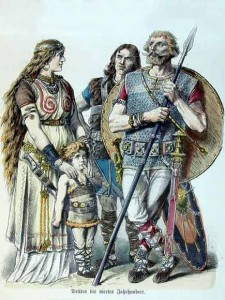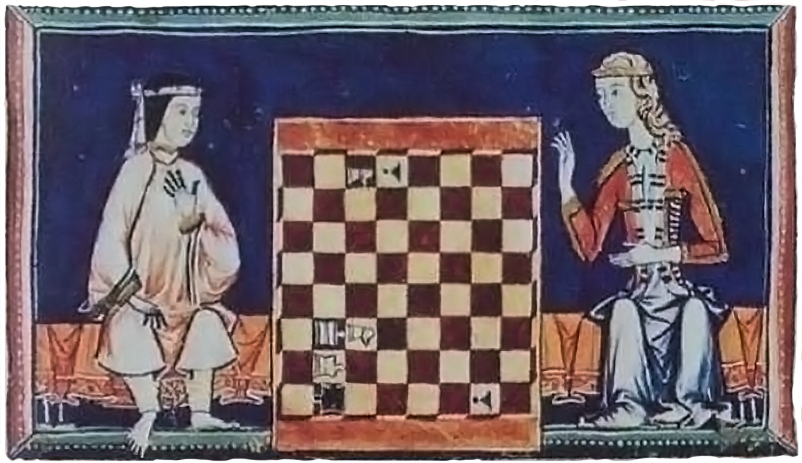
…as seen by the Romans.
A post not about an event or a story, this time, but a fascinating description.
 They choose their kings by birth, their generals for merit. These kings have not unlimited or arbitrary power, and the generals do more by example than by authority. If they are energetic, if they are conspicuous, if they fight in the front, they lead because they are admired. But to reprimand, to imprison, even to flog, is permitted to the priests alone, and that not as a punishment, or at the general’s bidding, but, as it were, by the mandate of the god whom they believe to inspire the warrior. They also carry with them into battle certain figures and images taken from their sacred groves. And what most stimulates their courage is, that their squadrons or battalions, instead of being formed by chance or by a fortuitous gathering, are composed of families and clans. Close by them, too, are those dearest to them, so that they hear the shrieks of women, the cries of infants. They are to every man the most sacred witnesses of his bravery-they are his most generous applauders. The soldier brings his wounds to mother and wife, who shrink not from counting or even demanding them and who administer food and encouragement to the combatants.
They choose their kings by birth, their generals for merit. These kings have not unlimited or arbitrary power, and the generals do more by example than by authority. If they are energetic, if they are conspicuous, if they fight in the front, they lead because they are admired. But to reprimand, to imprison, even to flog, is permitted to the priests alone, and that not as a punishment, or at the general’s bidding, but, as it were, by the mandate of the god whom they believe to inspire the warrior. They also carry with them into battle certain figures and images taken from their sacred groves. And what most stimulates their courage is, that their squadrons or battalions, instead of being formed by chance or by a fortuitous gathering, are composed of families and clans. Close by them, too, are those dearest to them, so that they hear the shrieks of women, the cries of infants. They are to every man the most sacred witnesses of his bravery-they are his most generous applauders. The soldier brings his wounds to mother and wife, who shrink not from counting or even demanding them and who administer food and encouragement to the combatants.
Tradition says that armies already wavering and giving way have been rallied by women who, with earnest entreaties and bosoms laid bare, have vividly represented the horrors of captivity, which the Germans fear with such extreme dread on behalf of their women, that the strongest tie by which a state can be bound is the being required to give, among the number of hostages, maidens of noble birth. They even believe that the sex has a certain sanctity and prescience, and they do not despise their counsels, or make light of their answers. In Vespasian’s days we saw Veleda, long regarded by many as a divinity. In former times, too, they venerated Aurinia, and many other women, but not with servile flatteries, or with sham deification.1
1Tacitus, The Agricola and Germania, A. J. Church and W. J. Brodribb, trans., (London: Macmillan, 1877), pp. 87ff

A rather topical, I feel, piece. Do not let the context and date fool you. Not much has changed, I feel.
The time* Appian is talking about, is around the end of the Roman Social War in 91-88 B.C.E., also known as the Allied War, because it was fought between the Roman Republic and most of the rest of Italy, that is, cities which had been Rome’s allies for centuries. However, Rome had virtually complete control of the cities’ foreign policies, including their interactions with one another. Not to mention that, by the 2nd century B.C.E., between half and two-thirds of the soldiers in the Roman army came from Italian allied cities. And yet no one from these cities had Roman citizenship, which they would rather have liked to acquire, since that would also give them a greater say on the Roman Republic’s policies. The Social War was in part caused by the assassination of Marcus Livius Drusus in 91 B.C.E., since his proposed reforms would have granted Roman citizenship to the Roman Allies.

The temple of Vesta on the left, and Castor and Pollux on the right. To compare with still extant ruins click here.
About the same time* dissensions arose in the city between debtors and creditors, since the latter exacted the money due to them with interest, although an old law distinctly forbade lending on interest and imposed a penalty upon any one doing so. It seems that the ancient Romans, like the Greeks, abhorred the taking of interest on loans as something knavish, and hard on the poor, and leading to contention and enmity; and by the same kind of reasoning the Persians considered lending as having itself a tendency to deceit and lying. But, since time had sanctioned the practice of taking interest, the creditors demanded it according to custom. The debtors, on the other hand, put off their payments on the plea of war and civil commotion. Some indeed threatened to exact the legal penalty from the interest-takers.
The praetor Asellio, who had charge of these matters, as he was not able to compose their differences by persuasion, allowed them to proceed against each other in the courts, thus bringing the deadlock due to the conflict of law and custom before the judges. The lenders, exasperated that the now obsolete law was being revived, killed the praetor in the following manner. He was offering sacrifice to Castor and Pollux in the forum, with a crowd standing around as was usual at such a ceremony. In the first place somebody threw a stone at him, on which he dropped the libation-bowl and ran toward the temple of Vesta. They then got ahead of him and prevented him from reaching the temple, and after he had fled into a tavern they cut his throat. Many of his pursuers, thinking that he had taken refuge with the Vestal virgins, ran in there, where it was not lawful for men to go. Thus was Asellio, while serving as praetor, and pouring out libation, and wearing the sacred gilded vestments customary in such ceremonies, slain at the second hour of the day in the centre of the forum, in the midst of the sacrifice. The Senate offered a reward of money to any free citizen, freedom to any slave, impunity to any accomplice, who should give testimony leading to the conviction of the murders of Asellio, but nobody gave any information. The money-lenders covered up everything.1
1Appian, Histories, trans. Horace White, vol. III, Harvard University Press, 1913: Loeb Classical Library, p. 101

 They choose their kings by birth, their generals for merit. These kings have not unlimited or arbitrary power, and the generals do more by example than by authority. If they are energetic, if they are conspicuous, if they fight in the front, they lead because they are admired. But to reprimand, to imprison, even to flog, is permitted to the priests alone, and that not as a punishment, or at the general’s bidding, but, as it were, by the mandate of the god whom they believe to inspire the warrior. They also carry with them into battle certain figures and images taken from their sacred groves. And what most stimulates their courage is, that their squadrons or battalions, instead of being formed by chance or by a fortuitous gathering, are composed of families and clans. Close by them, too, are those dearest to them, so that they hear the shrieks of women, the cries of infants. They are to every man the most sacred witnesses of his bravery-they are his most generous applauders. The soldier brings his wounds to mother and wife, who shrink not from counting or even demanding them and who administer food and encouragement to the combatants.
They choose their kings by birth, their generals for merit. These kings have not unlimited or arbitrary power, and the generals do more by example than by authority. If they are energetic, if they are conspicuous, if they fight in the front, they lead because they are admired. But to reprimand, to imprison, even to flog, is permitted to the priests alone, and that not as a punishment, or at the general’s bidding, but, as it were, by the mandate of the god whom they believe to inspire the warrior. They also carry with them into battle certain figures and images taken from their sacred groves. And what most stimulates their courage is, that their squadrons or battalions, instead of being formed by chance or by a fortuitous gathering, are composed of families and clans. Close by them, too, are those dearest to them, so that they hear the shrieks of women, the cries of infants. They are to every man the most sacred witnesses of his bravery-they are his most generous applauders. The soldier brings his wounds to mother and wife, who shrink not from counting or even demanding them and who administer food and encouragement to the combatants.




